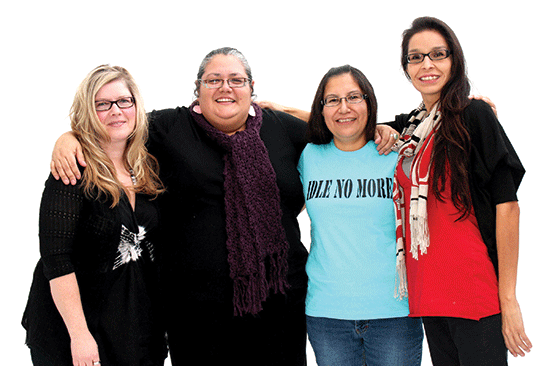But today, Idle No More is emerging as a powerful movement for the rights of native peoples to protect the lands and waters.

Founders of Idle No More, from left, Sheelah McLean, Nina Wilson, Sylvia McAdam, Jessica Gordon. Photo by Marcel Petit.
The stakes extend far beyond First Nations’ land. Bill C-45, which sparked the movement, paves the way for expansion of tar sands mining and for building a pipeline to carry some of the Earth’s most polluting, carbon-intensive oil from Alberta to the Pacific coast for shipment to overseas markets. NASA climate scientist James Hansen says burning large quantities of tar sands oil would mean “game over for the planet.”
YES! Magazine Executive Editor Sarah van Gelder spoke with two of the founders on January 13: Sylvia McAdam, an author and educator from the Nehiyaw (Cree) Nation, and Sheelah McLean, an instructor at the University of Saskatchewan whose ancestors were European settlers
Sarah van Gelder:
Sylvia and Sheelah, how did you each come to be involved in the founding of Idle No More?
Sylvia McAdam:
After I graduated from law school, I returned to my father’s traditional land near the Whitefish reserve and to the waters that I had been to when I was a child, and they were gone. The waters had dried up! It was a terrible thing to witness.
When my father and I went back to his traditional hunting lands, his cabin was gone. There was just a huge burn mark on the ground. When my father saw it, he just stood there, so quiet, so upset. It was terrible to watch.
“It’s so clear what the government is doing: the bill opens up the land for resource development, for oil pipelines.”
I started investigating, and I learned that the conservation officers had blocked hunting roads to keep the traditional indigenous hunters away, and the lands were being logged. I felt intensely protective of the land and the water, so I went around nailing boards on trees, saying, “No Trespassing. Treaty 6 Territory!”
When I read Bill C-45, I was horrified. I got into a chat on Facebook with Jessica and Nina, and I started explaining to them the implications of C-45 for the environment, for the waters. I told them there’s something in law called acquiescence. That means that if you’re silent, then your silence is taken as consent. All of us agreed that we couldn’t be silent, that grassroots people have a right to know.
And then I told them, “I know this phenomenal white woman,” and I pulled Sheelah in. When we first did our teach-in, we were literally laughed at. People did not take it seriously, and we were so poor—we had nothing.
Sheelah McLean:
I’m a third generation white settler. I taught native studies in high school, and my aboriginal students kept talking about the racism they experienced in school and in the community.
I wanted to understand more, so I did a Master’s degree in what’s called anti-racist, anti-oppressive education. I had amazing mentors—all indigenous women—who taught me about the impact of colonialism on indigenous people worldwide. I did a lot of research on capitalism, globalization, and how racism is used to justify unequal relationships between settler societies and indigenous peoples.
van Gelder:
Where did the name Idle No More come from?
McAdam:
Jessica said, “We’re all being far too idle. We’re going to be idle no more!” And that became the name of our Facebook chat. It was not intended to dishonor the hard work of phenomenal, passionate, determined activists and lovers of the land. When we said “Idle No More,” we meant we had been idle, and we didn’t want to be anymore.
van Gelder: What is at stake here? What does Bill C-45 represent and what does this moment represent?
McAdam:
Bill C-45 is an omnibus budget bill. It lumps a slew of bills under one name. There are two that are especially detrimental. One removes much of the protection under the Navigable Waters Protection Act and, in some cases, totally removes that protection. It gives major corporations direct and easy access to our waters and to our land.
McLean:
It’s so clear what the government is doing: The bill opens the land for resource development, for oil pipelines.
People have been socialized to believe that an economy that relies on nonrenewable resource extraction creates jobs and brings money to our communities. But look at what’s happening to communities in Alberta’s tar sands region, which has one of the highest debts of any province in Canada. What about the poisoned land and water, and the fact that there are many aboriginal communities around the tar sands with very high rates of cancer, and types of cancer that have never been seen before? This is the time to say, “Enough is enough.”
McAdam:
There’s also an amendment to the Indian Act in the bill that allows for surrender of reserve land without proper consent of all Indian people affected and makes it easier for land to be redesignated to allow, for example, nuclear waste to be stored.
McLean:
These attacks are directed at indigenous peoples because the government is very aware that First Nations people can stop development on their land. These attacks are coming because multinational corporations want nonrenewable resource extraction.
So everything is at stake. We know about climate change and that it’s already affecting many species and also our communities. We can’t live in a world that doesn’t have clean air and land and water.
van Gelder:
Watching from a distance, it’s extraordinary to see how quickly Idle No More took hold.
McLean:
A key element is that it speaks the truth. The truth is that this continent, Turtle Island, was supposed to be built on nation-to-nation relationships with indigenous people. We’re just trying to rebuild that. The second truth is that we all need healthy air, water, and land. alThe other thing is that there’s a spirit and a heart to this movement. It’s about love, about honoring human dignity, and about honoring our relationship with the land.
McAdam:
I believe it was that spirituality — the combination of many prayers — that has been the biggest support to this movement. As we moved out into the communities with our teachings, I would approach elders and give them tobacco and a gift as a way of asking for their support in a sacred way. It was so beautiful to hear them speak about how this movement has a sense of liberation, a sense of freedom, a sense of empowerment for all people.
van Gelder:
Do you have children?
McLean:
We’re all moms, all four of us.
McAdam:
I think one of our strongest motivations is our children. We want them to witness that we weren’t silent about Bill C-45, and we want them to be able to be a part of our resistance.
van Gelder:
How does it feel to see people across Canada, the United States, and all over supporting you?
McAdam:
I can’t tell you how many times we’ve wept.
van Gelder:
How do you see the role of non-natives in this movement?
McAdam:
When Nina, Jessica, and I began to realize that we had a real chance of becoming self-determining because of this movement, we were high-fiving each other — we were so happy, so full of joy. Then we saw Sheela, and she was quietly looking at us, and we realized that we could not leave her behind.
The Canadian government is not acting in the best interests of Canadian citizens, so we have to defend them as well. This is what the elders have directed us. The treaty informs us that we adopted the Europeans and the subsequent descendents; they’ve become a part of our family, so they must be protected.
McLean:
For settlers, I think it’s important to support indigenous sovereignty because our humanity is tied up together. Attacks on one group hurt us all. Allies play an important role in this movement; there are lots of us at those rallies and round dances. I think people should just join in.
McAdam:
Yeah, Sheelah, remember the Raging Grannies?
There’s something happening in Calgary, and it doesn’t have anything to do with the flash mobs. Some grassroots allies built a symbolic little coffin, and they put “Racism” on the side of it, and they’re going to have people send letters, and poems, and songs, or whatever, saying goodbye to racism. I thought that was so cool!
van Gelder:
Let me ask you about Chief Spence, who is on a hunger strike as we speak, and the other chiefs. Are they part of your movement?
McAdam:
The face of Idle No More is the face of all grassroots people, not specifically one person. It’s the face of the many who have fasted, and walked, and been part of rallies, who have been organizing from the very beginning.
van Gelder:
What’s your view about the blockade of railroads, highways, and border crossings?
McAdam:
We don’t support really dramatic actions because our children and our elders are there, and their safety is a priority. As this movement goes global, we’re concerned that those types of actions will give people reason to use further violence against indigenous people. And I think a lot of people would agree that our peaceful actions have worked.
van Gelder:
When you think of people sitting on train tracks, for example, do you consider that a violent act?
McAdam:
Suppose a community were to come to us as Idle No More asking if they could blockade a road leading to where there’s going to be devastation to land — say, fracking. We would ask that they do ceremony and prayers, and that grassroots people — like the elders — be spoken to and their direction be asked. I think then Idle No More would support those types of blockades.
van Gelder:
When you imagine the sort of world you’re hoping your children will grow up into, what are some of the features of that world?
McLean:
I have visions of tackling inequality; we’re one of the richest countries in the world off indigenous lands and resources, and yet they are some of the poorest communities. And I’d like to see sustainable communities. What’s beautiful is that sustainable energy and technologies are absolutely in line with everything that Sylvia talks about in terms of indigenous laws on how to live with the land.
McAdam:
It’s absolutely that, yeah. For me it’s also self-determination for my people. And I would like that young people no longer utilize suicide as an option.
van Gelder:
How do you see things going from here?
McLean:
We’re starting to connect to the global community, to the United Nations, to solidarity groups around the world. Indigenous peoples worldwide are facing these same issues of having their land taken away, their resources extracted, and their land and water poisoned.
As more and more people come on board, it will take the shape that it needs to take. Each community has to decide how they’re going to tackle the issues of sovereignty and rethinking what it means to live with the land and water. It is going to continue to grow, there’s no doubt about that. And it will take various forms of resistance and building.
McAdam:
Indigenous self-determination, sovereignty, protection of land and water, and however that looks, I think those are critical at this point, and we’ll keep working toward that, until those things are in place.
Sarah van Gelder interviewed Sylvia McAdam and Sheelah McLean for How Cooperatives Are Driving the New Economy, the Spring 2013 issue of YES! Magazine.







